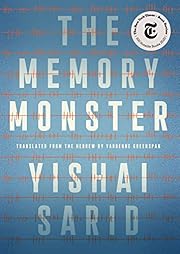

Auf ein Miniaturbild klicken, um zu Google Books zu gelangen.
|
Lädt ... The Memory Monstervon Yishai Sarid
 Top Five Books of 2020 (408) Five star books (651) Keine aktuelle Diskussion zu diesem Buch. ***WHY A MAYBE?*** I rarely read these kind of books. It's about a period in history I really disliked hearing about in school because we 'learned' it every year. The same thing over and over again. But this sounds really interesting and I do want to search out a dutch translation of it so I can gift it someone. This is just the kind of thing they would enjoy. The narrator of this short novel is a "Holocaust Guide," a "Poland Extermination Camp Expert." He primarily lives in Poland (his wife and child are in Israel), and guides groups and individuals (mostly Israeli school groups "so they will never forget" and visiting dignitaries) to the various death camps, Auschwitz, Birkenau, Belzec, Sobibor, Treblinka. The novel is in the form of a letter to the head of Yad Vashem, purportedly a report by the narrator to explain what happened to him personally as he faced the memory and the reality of the atrocities. What the book documents is an account of the unraveling of an individual. This was a dark book, set in the present day, but with the evils of the Holocaust lurking all around. How can we ever make sense of those events? Yet, how can we live with the memories of such evils? Recommended. 4 stars Harrowing, exceedingly detailed and beyond sad, this is a story of a Ph.D. man who was taken under the wing of the Dean of the History Department of a college, soon the narrator becomes a member of Yad Yashem, a memorial to the victims of the Holocaust. The man becomes a leading expert of the Nazi methods of extermination. As his studies progress in the nightmare that was Treblinka, Auschwitz, Auschwitz-Birkenau, and some of the lessor known of the approximately 1,000 concentration camps throughout Poland, Germany and other countries as the Germans needed land and choose to move and more eastward. As he gains extensive knowledge, he is offered the task of leading groups for one week as he takes the people further and further into the madness of Hitler and his country, now gone to sheer hell. He becomes more and more obsessed, describing the minute details that most do not want to learn. He knows all the placement of the guards, their rank, the tragic Jews, and others deemed unnecessary, and he proceeds to clearly, in a calm voice the system of killing, the chemicals used to kill. On his first trips with high school children, he is reported as aloof, cold and a fact-finding machine. As he progresses to lead more and more into the sheer madness, he becomes more animated and he is now shouting out the statistics, the horror, the dismemberment, the taking of the fillings of the Jews, the cutting of the hair, and then the walking to the death while music is played. Leaving his wife and family at home in Israel, he now does not have other guides with him. Tour groups are sent to him. As he watches the expressions on the faces of those whom he guides, he becomes more or less animated based on what he feels like telling them. There is a slow winding into madness as he reaches the point of no return, and the characters are in a play, a never ending play of insanity. Chilling, well written and beyond sad! Zeige 4 von 4 keine Rezensionen | Rezension hinzufügen
AuszeichnungenPrestigeträchtige Auswahlen
"The English-language debut of celebrated Israeli novelist Yishai Sarid is a fierce and harrowing tale of reckoning with the horror of the Holocaust, and how memory and the effort to preserve it can become an all-consuming monster. The narrator of Yishai Sarid's powerful novel is a young, initially reluctant Holocaust scholar working at Yad Vashem, Israel's memorial to the victims of the Holocaust. A diligent historian, he soon becomes a leading expert on Nazi methods of extermination at concentration camps in Poland during World War II, and guides tours through the camps for students and visiting dignitaries. He hungrily devours every detail of life and death in the camps and takes pride in being able to recreate for his audience the excruciating last moments of the victims' lives, and the process by which enslaved Jews were forced to dispose of the remains. The job becomes a mission, and then an addiction. Spending so much time immersed in death, his connections with the living begin to deteriorate. He resents the students lost in their iPhones, singing sentimental songs, not expressing sufficient outrage at the mass murder committed by the Germans. In fact, he even begins to detect, in the students as well as himself, a hint of admiration for the murderers--their efficiency, audacity, and determination. Force is the only way to resist force, he comes to think, and one must be prepared to kill."--Provided by publisher. Keine Bibliotheksbeschreibungen gefunden. |
Aktuelle DiskussionenKeineBeliebte Umschlagbilder
 Google Books — Lädt ... Google Books — Lädt ...GenresMelvil Decimal System (DDC)892.4Literature Literature of other languages Middle Eastern languages Jewish, Israeli, and HebrewKlassifikation der Library of Congress [LCC] (USA)BewertungDurchschnitt: (4.03) (4.03)
Bist das du?Werde ein LibraryThing-Autor. |
||||||||||||||||||||||||||||||||||||||||||||||||||||||||||||||||||||||||||||||||||||||||||||||||||||||||||||||||||||||||
Escrita con un lenguaje preciso e incisivo, El monstruo de la memoria es una novela de resonancia universal que advierte de los peligros que acechan a los países y a sus pueblos a la hora de construir una memoria histórica. En este relato de ascenso y caída inevitable, Sarid despliega los procesos destructivos y perversos que atraviesa un agente de la memoria en el intento de hacer bien su trabajo (